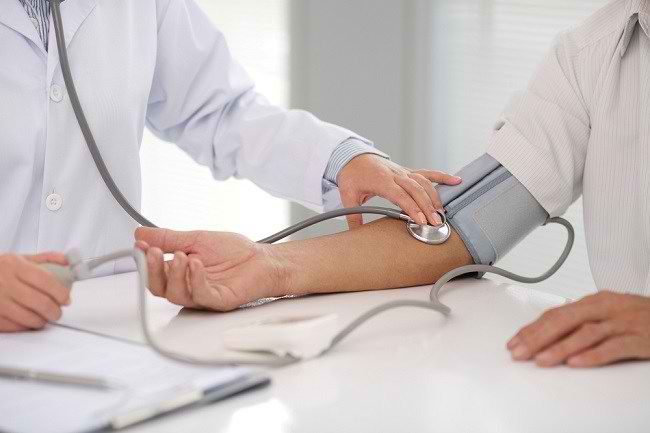Hypotension and Hypertension, Which Is More Harmful?
Malignant hypertension is a medical emergency that occurs when blood pressure rises dramatically to far exceed its normal threshold. This condition can appear quickly and suddenly. If not treated immediately, malignant hypertension can cause damage to organs, even death.
Malignant hypertension is an emergency condition of severe hypertension. Malignant hypertension is characterized by a surge in blood pressure to reach 180/120 mmHg or higher than that number.

In fact, normal adult blood pressure around 120/80 mm Hg. The figure of 120 mmHg shows systolic pressure, while 80 mmHg shows diastolic pressure.
Hypertension is often asymptomatic, so many people do not realize that they suffer from hypertension or high blood pressure. If left untreated, hypertension can become more severe and develop into malignant hypertension.
When you have malignant hypertension, sufferers of this condition can experience damage to various organs of the body, such as the brain, kidneys, heart, eyes, and lungs. However, in some cases, the cause of malignant hypertension is often not clearly known.
Symptoms and Compilation of Malignant Hypertension
Some people with malignant hypertension may not experience any complaints. However, others can experience the following symptoms:
- Blurred vision
- Severe headaches
- Nausea and vomiting
- Chest pain and chest palpitations
- Tingling or numbness
- The amount of urine is reduced or less
- Nosebleed
- Shortness of breath
- Changes in mental status, such as confusion, anxiety, difficulty concentrating, and often sleepy
- Seizure
- passed out
If not treated immediately, malignant hypertension can cause various complications, such as:
- Swelling or pulmonary edema
- stroke
- Heart attack
- Heart failure
- Kidney failure
- Death
People at Risk of Malignant Hypertension Attack
Malignant hypertension is actually quite rare. This condition is estimated to only occur in about 1-2 people of 1 million sufferers of high blood pressure. Although classified as rare, malignant hypertension is a very dangerous medical emergency.
Until now, the cause of malignant hypertension is still unknown with certainty. However, several studies have shown that damage to blood vessels in the body's organs is often one of the factors that can trigger malignant hypertension.
In addition, there are several conditions that are known to increase a person's risk of developing malignant hypertension, namely:
- High blood pressure that is not controlled properly, for example due to lack of regular taking medication
- Unhealthy lifestyles, for example smoking frequently and consuming alcoholic beverages, and often consuming foods high in salt and fat
- Kidney diseases, such as kidney failure
- Autoimmune disorders, such as scleroderma
- Tumors of the adrenal glands, including pheochromocytoma
- Preeclampsia
- Spinal injury
- Side effects of certain drugs, such as birth control pills, antidepressant drugs, NSAIDs, corticosteroids, and illegal drugs such as cocaine and amphetamines.
Diagnosis and Treatment of Malignant Hypertension
Malignant hypertension is important to detect early so as not to cause fatal complications. To diagnose malignant hypertension, the doctor will conduct a physical examination, including blood pressure measurement, and several supporting examinations, such as:
- Blood and urine tests
- Examination of kidney function
- Radiological examination, such as X-ray, angiography, ultrasound, CT scan, and MRI
- Echocardiogram and electrocardiogram
If the results of the doctor's examination indicate that the patient has malignant hypertension, the treatment needs to be done in the hospital. If malignant hypertension has caused severe damage to organs, the sufferer may need to undergo treatment in the ICU (intensive care unit).
The main purpose of managing malignant hypertension is to gradually reduce high blood pressure. To treat malignant hypertension, doctors can provide the following treatment:
Provision of medicines
Malignant hypertension needs to be treated with antihypertensive drugs as soon as possible. Generally, doctors will give blood pressure-lowering drugs or antihypertensives by injection in infusions.
Once the blood pressure begins to decrease and stabilize, the doctor can replace the injection of antihypertensive medication with an antihypertensive drug in the form of a oral medication. Antihypertensive drugs are also given when the patient is allowed to go home from the hospital.
In addition, the doctor may also give other medicines, such as diuretic drugs, if the patient experiences pulmonary edema or brain swelling.
Oxygen therapy
Malignant hypertension sufferers may experience respiratory distress, fainting, or even coma. This can cause sufferers to experience lack of oxygen. Therefore, doctors can provide oxygen therapy through oxygen hoses or masks.
If the patient is comatose or unable to breathe, the doctor may give oxygen therapy through a ventilator.
Wash your blood
If it has caused severe kidney damage or kidney failure, people with malignant hypertension may need to undergo dialysis procedures. However, this action is usually only done if the blood pressure is controlled and the patient is declared able to undergo dialysis.
Prevent Malignant Hypertension in These Methods
To prevent this dangerous attack of hypertension, you need to have regular blood pressure checks at the hospital and at home with a blood pressure meter (tensimeter).
If you already suffer from hypertension, do not forget to take the medication your doctor prescribes regularly and do not reduce the dose or skip the drink time.
In addition, you are also advised to live a healthy lifestyle, such as:
- Increase consumption of fruits and vegetables and limit or reduce the consumption of foods high in salt and high in saturated fat
- Exercise regularly
- Stop smoking and stay away from cigarette smoke
- Get enough rest
- Reduce stress
In order not to experience malignant hypertension, you can maintain blood pressure to remain stable in a number of ways above. If you do have hypertension, don't forget to take antihypertensive medication regularly and have a medical check-up to the doctor regularly.
If you have experienced some signs and symptoms of malignant hypertension, immediately consult a doctor at the hospital. It is intended that malignant hypertension can be treated quickly, so that dangerous complications due to this attack can be prevented.
Label : Health
Comments
Post a Comment